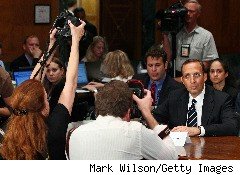 Today the Financial Crisis Inquiry Commission, a bipartisan panel of legislators and others set up by Congress to probe the causes of the financial meltdown, continues its long series of hearings with one dedicated to the role of derivatives. The second panel of today’s hearing focused on American International Group (AIG), which was famously brought down by derivatives gone bad and bailed out by U.S. taxpayers to the tune of $182 billion.
Today the Financial Crisis Inquiry Commission, a bipartisan panel of legislators and others set up by Congress to probe the causes of the financial meltdown, continues its long series of hearings with one dedicated to the role of derivatives. The second panel of today’s hearing focused on American International Group (AIG), which was famously brought down by derivatives gone bad and bailed out by U.S. taxpayers to the tune of $182 billion.
The panel featured testimony by Joseph Cassano, the ex-CEO of AIG’s Financial Products division, the outfit that made the credit-default swap commitments driving AIG’s catastrophic losses.
This Bailout Is Too Expensive
Cassano is speaking publicly for the first time; he had been facing a criminal probe that recently wound up without charges being filed. One of the striking points Cassano made was his criticism of the taxpayer bailout of AIG as needlessly expensive. AIG was brought down when declines in the values of the assets underlying its credit-default swaps gave AIG’s counterparties — the banks — the right to demand that AIG give them collateral to guarantee AIG’s performance under the swaps.
In Cassano’s last six months on the job, the banks started demanding collateral in large amounts. Cassano testified today that he used the contracts AIG had with the banks to successfully negotiate down the amount of collateral being demanded.
In contrast, when the government bailed out AIG, it paid 100 cents on the dollar amount demanded by the banks, totaling over $67 billion of the taxpayer funds given to AIG. Cassano said he had no idea why the government paid full price, noting that it could have acted the way he had when he was at AIG, using the terms of the contracts with the banks to negotiate substantially lower payments. Cassano asserted he could have “negotiated an appreciably better deal” for taxpayers.
AIG Prevented From Suing Banks
Cassano’s point about the government not using AIG’s contractual rights to negotiate against the banks jibes nicely with this morning’s reporting that regulators forced AIG to sign a legal waiver as part of the bailout that prevents AIG from suing the banks. The article also suggests that the government was unduly deferential to the banks, rejecting advisers’ suggestions not to pay 100 cents on the dollar.
A recent Congressional report is also critical of the AIG bailout, similarly noting that the government failed to use its leverage to negotiate a better deal for taxpayers.


Leave a Reply